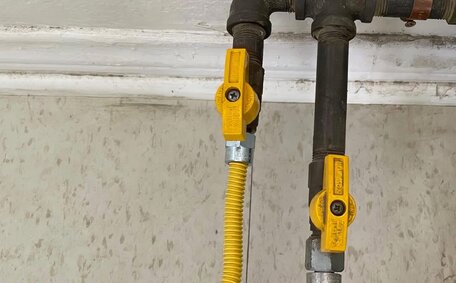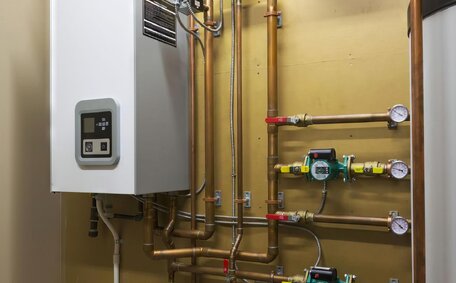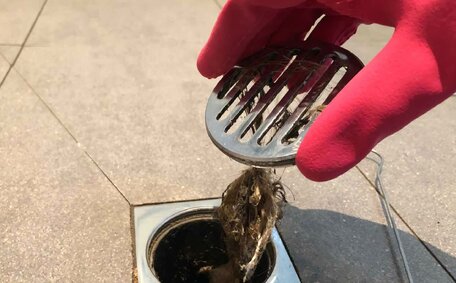Recognizing the Smell of a Gas Leak
When you smell gas in your house, it’s an immediate alert that there may be an issue near appliances or within gas lines and pipes. Immediate action is critical when you detect a gas leak due to the serious risk of explosions, fires, carbon monoxide poisoning, or other safety hazards it poses.
Evacuate the area without delay and dial 000 if you suspect a gas leak. Australian gas is laced with a purposeful odorant called mercaptan, giving it that characteristic scent, thus you can smell if there’s a leak.
Key indicators of a gas leak that could compromise your family’s safety include:
- A distinctive rotten-egg scent near gas lines, indicating a potential leak inside or outside your home
- Bubbling or noises coming from gas appliances
- Dirt or dust blowing from underground gas lines
- Hissing or whistling sounds coming from gas appliances or extinguished pilot lights
- Dead plants or grass in otherwise lush areas above gas lines
- Flames or ignition sources near gas lines or leak coming from the ground or burning above
If a gas odour is present, promptly leave the building, call emergency services, and if possible, shut off your gas appliances and main gas supply.
What should be my urgent focus? A gas leak.
Warning Signs of a Gas Leak
Besides the obvious "rotten egg" odour, additional warning signs may herald a gas leak in your home. Vigilance is crucial; immediately respond to any signs of gas odor inside your home indicating a breach.
Important indicators of a potential gas leak from your system include:
- Hissing or whistling noises emanating from gas appliances or detectable along gas pipe lines
- Visible damage, dents, or leaks in gas piping
- Bubbling in wet areas above gas lines
- Flames or blowing dirt around gas lines
- Dead vegetation or grass above underground gas piping
- Dirt blowing from cracks in the ground above gas lines
Recognizing these indicators of a gas leak, evacuate swiftly and alert emergency services without hesitation. Do not overlook any visual or audible indications of a leak.
Switch off all electrical devices and avoid igniting any flames to prevent triggering an explosion if gas is present. Exercise extreme caution and call for professional help if you suspect a gas leak.
What to Do Immediately if You Detect a Gas Leak
If you smell gas or detect signs of a leak, immediately take steps to ensure your household’s safety. Here are essential steps to maintain gas safety and protect your gas systems both within and around your home:
- If a gas leak is detectable, quickly guide everyone to safety and shut off your home’s gas supply if it’s safe to do so.
- Keep away from any electrical devices or appliances, especially mobile phones, which could accidentally cause an explosion.
- Ventilate the area by opening windows and doors to allow fresh air to disperse the accumulated gas.
- From a secured location, dial 000 and contact your gas distributor to promptly report gas leak occurrences.
- Refrain from re-entering or using electrical switches until emergency services declare it safe or after shutting off the main gas valve.
- Where possible and with knowledge of the procedure, carefully turn off the gas at the main valve. If it requires tools or entering unsafe areas, call professional services and wait for their arrival.
Immediate response to a gas leak is necessary to manage potential dangers decisively. Do not attempt to collect personal items or investigate the leak. Dial the emergency number the moment it’s safe do.
The crucial step when detecting a source leak of gas is to vacate the premises swiftly and move to higher and upwind locations if achievable. Stay calm but act fast, as a gas leak can quickly fill rooms and potentially lead to fire, explosion, poisoning, or suffocation hazards if not addressed promptly.
Health and Safety Risks of Gas Leaks
Symptoms of a gas leak your personal appliances or piping may betray, like feeling unwell, pose consequential health and safety risks, necessitating serious attention. Inhaling natural gas can lead to fainting, headaches, dizziness, nausea, and irritation to eyes and airways. Prolonged exposure may also result in chemical asphyxiation by displacing oxygen, potentially leading to unconsciousness or even death in poorly ventilated spaces.
Both natural gas and propane are highly flammable, and substantial leaks can cause devastating fires or extensive structural damage. Gas is commonly mixed with air for combustion, so leaking gas can ignite from a nearby open flame or spark at concentrations as low as 5%. This makes early leak detection critical for preventing deadly disasters.
Should symptoms like headaches, dizziness, or difficulty breathing arise after a gas leak, seek immediate medical attention.
Fumes may persist even after gas leak situations are under control.
Quick evacuation and ventilation while contacting professionals can mitigate health risks and avert gas fires.
Gas leaks can swiftly reduce oxygen levels to unsafe points, heightening risks in the affected areas.
Preventing Future Gas Leaks
Gas leaks often occur due to issues with gas appliances, gas pipes, or other components that wear out over time. Regular maintenance, updates, and gas bill scrutiny are strategies to forestall hazardous leaks in your abode.
Safety tips to help avoid future gas leaks for your gas appliance include:
- Maintain safety by having all gas appliances checked annually by a licensed gas professional, crucial for household safety. Licensed gasfitters play a key role in early detection and necessary repairs.
- Consider upgrading old gas appliances like water heaters or stoves to newer, more efficient models less prone to leakage.
- Make sure your home is protected by installing advanced gas detectors that identify gas smell and warn of leaks, even as odorant signatures wane. Opt for detectors with battery backups in case power fails.
- Perform regular inspections for corrosion in pipes to ensure an undisturbed flow, especially in areas where gas leak could materialise.
- Keep the area around your gas meter and appliances clear so leaks can be spotted quickly.
- Learn where your meter and main gas shutoff valve are located in case you need to manually shut off gas.
- Call a professional immediately if pipes sustain damage or if you suspect a gas leak in your system.
At Jannali Plumbing, we have strong ties to the Australian gas networks and are ready for you to contact us for thorough gas line inspections and tune-ups by our licensed gas fitters. Contact us today at 1300 349 338 or [email protected] to schedule preventative maintenance.






